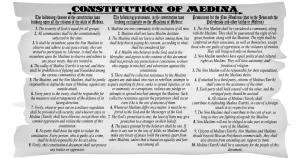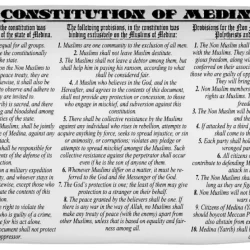We are all concerned about the term “fundamental state principles” or, “principles of state principles” or “directives.” Every constitution incorporates these principles more or less. We can find these principles in the Constitution of Bangladesh as well as in the Indian Constitution. In the constitution of Bangladesh, the fundamental principles are incorporated in part three of the constitution from articles 8 to 25.
Here in this part of the Fundamental Principles of State Policy, the very first article 8, mentions that “nationalism, socialism, democracy, and secularism, together with the principles derived from those as set out in this Part, shall constitute the fundamental principles of state policy.” It also mentions in the next paragraph that “the principles set out in this Part shall be fundamental to the governance of Bangladesh, shall be applied by the state in the making of laws, shall be a guide to the interpretation of the Constitution and of the other laws of Bangladesh, and shall form the basis of the work of the state and of its citizens, but shall not be judicially enforceable.” But what does the term, “fundamental principles of state policy” mean?
What are the fundamental principles of state policy?
As a concept in constitutional law, “fundamental principles of state policy” lack a common definition. There is no formal or accepted definition of the principles of state policy. However, as the term suggests, it refers to the concept of the guidelines for establishing policies that are fundamental.
Generally, the principles of the governance of the state refer to those principles or principles that are considered or act as the basis or main driving force for the governance of that state as an integral part of the constitution of a state.
These principles determine the basis of a state’s social, economic, administrative, and foreign policies. In addition, the principles of running the state work to make the laws of the state and explain those laws. A state cannot make a law contrary to the concept of these principles. It guides the state to enact and interpret the law accordingly.

So, we can define the term “basic principles of state policy” as the concept that serves as the fundamental framework for determining social, economic, administrative, or international policy, as well as for enacting laws and interpreting the Constitution and existing laws.
In light of these principles, the state formulates its constitution and laws, and based on these principles, the interpretation of the constitution and other laws is analyzed. In addition, the principles serve as the basis for determining and managing the relationship between the state and the citizen. But it is shocking to know that these principles, which are invariably present in all constitutions, cannot be enforced in a court of law. Because of its unenforceability by the court, it is subordinate to the fundamental rights protected under the constitution, though the principles paved the path to create and ensure fundamental rights.
Characteristics of fundamental principles of state policy
Though the primary feature of fundamental principles of state policy is their inability to be enforced by the courts, the critique identifies several other features.
First of all, the Constitution refers to these as “beau idea,” or the highest caliber of brilliance. Because they uphold the fundamentals of lofty objectives like economic liberation, the eradication of poverty, the eradication of illiteracy, etc.
Second, because they are the most idealistic phrases recorded in the Constitution without any provisions for their enforcement, these are referred to as a “veritable dustbin of sentiment.” Therefore, they are little more than a sentimental representation of the constitution makers’ goodwill.
Thirdly, these are something described as “decorative in the Constitution”. The principles are not necessary for the Constitution, but they act like decorations. Through these principles, the desire in the minds of the people is reflected, but there is no provision of rule in these laws. They are what Professor K.C. refers to as the Constitution’s “paragraph of generalities.” Additionally, Professor Ivor Jennings has questioned the logic of including such provisions in a constitution, referring to them as “expressions of Fabian socialism without socialism” and “the ghost of Sidney and Beatrice Webb Stalk across the pages of the constitution.”
Fourthly, because they all relate to economic, social, and cultural rights that are not immediately achievable, these principles are often referred to as “a moral discourse on the one hand and a manifesto of ideals and aspirations on the other hand.” They are objectives that the state must achieve, and in keeping with socioeconomic advancement, the state will gradually put them into practice. They function as government programs as a result.
Read Hypocrite Germany lost to Japan and their cry for Human Rights
Is it enforceable?
Though the fundamental principles of state policy are essential for the state’s constitution and its legal system to run accordingly, we already know that the fundamental state principles are not enforceable by the court. In Kudrat-E-Elahi Panir vs Bangladesh case, the Supreme Court of Bangladesh expresses that, the fundamental state principles are not law and they are enforceable by the court. But why? What is the reason behind the unenforceability of such important basics of a constitution?
Basically, the fundamental principles of state policy are a bunch of fundamental frameworks for determining social, economic, administrative, or international policy. Several social, economic, and cultural rights and responsibilities are created and ensured in light of fundamental state principles like the governing system of a state, whether it is a democracy or an authoritarian regime, its, political rights, its property management system, etc. These are not guaranteed as fundamental rights by the state.
The reason behind the unenforceability of the fundamental state policy is that the state does not have enough resources to provide for the people. To ensure the people’s rights through these principles, the state must have enough resources. Within a certain period, a state may achieve this capability by utilizing its own resources and foreign aid properly. It cannot be achieved overnight.
Citizen rights or any political rights, such as freedom of expression, freedom of assembly, or right to property, can be ensured. The constitution can ensure its people by declaring them in the constitution in no time, but the same is not possible in the case of fundamental state principles.
The fundamental principles of state policy are different from the fundamental rights. For example, we can mention the rights under the “Provision of Basic Necessities,” such as the right to reasonable rest, recreation, and leisure, or the right to free and compulsory education, both of which are very much compulsory to a state. But because of limited resources, a state cannot protect these provisions as fundamental rights or enforce them through the courts. The state cannot ensure such huge responsibility as a right to the people, merely, it can make policies regarding such issues! Maybe this is why fundamental principles or directives are referred to as a “veritable dustbin of sentiment.” as they have no provisions for their enforcement.
Along with these characteristics, another interesting characteristic of the fundamental principles of state policy is, it can not be implemented over foreigners, except for foreigners residing in Bangladesh. It is merely declaratory and guides the states as to where to go, how to go, and when to go.
Should it be made enforceable?
Although the socio-economic rights listed in Articles 8 to 25 of the Fundamental Principles of State Policy are a person’s unalienable rights, the Bangladesh Constitution’s designers made them judicially unenforceable by including a clause in Article 8(2). They made the Constitution a ‘veritable dustbin of sentiment’ that merely ‘decorate’ the document. These key ideas served only as a framework for their interpretation of the Constitution. Its inapplicability may be caused by a lack of resources as well as a capacity overburden on the state.
Regarding Bangladesh, due to Bangladesh’s vast population and continued status as a developing nation, the government occasionally finds it challenging to give each and every citizen with the appropriate level of care. The idea of separation of powers prohibits the court from enforcing socio-economic rights, which are the responsibility of the government. As a result, the judiciary is unable to uphold these rights.
The unenforceability issue of fundamental principles of state policy in Bangladesh first came to light in the case of Kudrat-E-Elahi Panir vs. Bangladesh. Here, in this case, the Supreme Court of Bangladesh expresses that, the fundamental state principles are not law and they are enforceable by the court. Therefore, it is against the law of the Constitution itself to equate principles with laws. As a result, other laws cannot be declared unconstitutional because they conflict with these principles.
However, Justice Badrul Haider Chowdhury opposed the previous view. In the case of Anwar Hossain v. Bangladesh, he declared that these principles are essential to the nation’s governance and that it is the responsibility of the state to use them while passing laws. These principles cannot be changed, and these ideas commonly come up and are always applicable while executing the fundamental rights outlined in Part III. For instance, Article 27 essentially says the same thing as Article 19, and Article 32 echoes Article 18’s concept. Therefore, implementing these socioeconomic rights is absolutely necessary for the enforcement of fundamental rights.
Making socio-economic rights judicially enforceable will oblige the state to uphold them, make good use of its resources, and foster an environment that is fair for its citizens and lessens social inequality. As the nation moves toward rapid uplift, the government, lawmakers, and academics should reconsider the enforceability of these rights.















